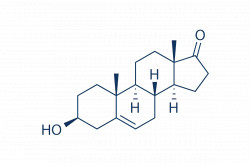Dhea - Revlimid (Lenalidomide) Interaction
Herbal: Dhea
Also Known As: 3b-Hydroxy-Androst-5-Ene-17-One, 3BetaHydroxy-Androst-5-Ene-17-One, Androstenolone, Déhydroépiandrostérone, DHEA-S, GL701, Prasterone
Drug: Lenalidomide
Brand names:
Revlimid

Medical Content Editor Dr. Brian Staiger, PharmD
Last updated
Jun 15, 2025
Interaction Details
There were no interactions found between Lenalidomide and Dhea. This does not mean the potential for an interaction does not exist, however. There is often a lack of studies and data surrounding traditional medicine, especially concerning drug interactions, so it is important to always consult your provider before making any changes to your medication regimen.
Dhea Overview
 Dehydroepiandrosterone (DHEA) is a natural (i.e., endogenous) hormone produced by the adrenal gland and is among the most abundant steroid hormones in the human body. It is a precursor to the hormones testosterone and estrogen, and it is thought to have various effects on the body. DHEA levels naturally decline with age. It is a popular over the counter supplement that is purported to have a variety of health benefits, including increasing muscle mass, improving cognitive function, improving mood and reducing the risk of heart disease and diabetes. The scientific evidence supporting the use of DHEA for these purposes is limited and mixed. Additionally, it could potentially interact with several different medications so if you are considering taking DHEA supplements, it is important to speak with a healthcare professional.
DHEA should not be confused with other supplements containing the letters 'DHEA'. 7-alpha-hydroxy-DHEA, 7-beta-hydroxy-DHEA, and 7-keto-DHEA, all contain DHEA as the parent compound with additional structures attached.
Dehydroepiandrosterone (DHEA) is a natural (i.e., endogenous) hormone produced by the adrenal gland and is among the most abundant steroid hormones in the human body. It is a precursor to the hormones testosterone and estrogen, and it is thought to have various effects on the body. DHEA levels naturally decline with age. It is a popular over the counter supplement that is purported to have a variety of health benefits, including increasing muscle mass, improving cognitive function, improving mood and reducing the risk of heart disease and diabetes. The scientific evidence supporting the use of DHEA for these purposes is limited and mixed. Additionally, it could potentially interact with several different medications so if you are considering taking DHEA supplements, it is important to speak with a healthcare professional.
DHEA should not be confused with other supplements containing the letters 'DHEA'. 7-alpha-hydroxy-DHEA, 7-beta-hydroxy-DHEA, and 7-keto-DHEA, all contain DHEA as the parent compound with additional structures attached.
Lenalidomide Overview
-
Lenalidomide is used to treat a certain type of myelodysplastic syndrome (a group of conditions in which the bone marrow produces blood cells that are misshapen and does not produce enough healthy blood cells). Lenalidomide is also used along with dexamethasone to treat people with multiple myeloma (a type of cancer of the bone marrow). It is also used to treat people with multiple myeloma after a hematopoietic stem-cell transplant (HSCT; procedure in which certain blood cells are removed from the body and then returned to the body). Lenalidomide is also used to treat people with mantle cell lymphoma (a fast-growing cancer that begins in the cells of the immune system) who have been treated with bortezomib (Velcade) and at least one other medication. Lenalidomide should not be used to treat people with chronic lymphocytic leukemia (a type of cancer of the white blood cells that gets worse slowly over time) unless they are participating in a clinical trial (research study to see whether a medication may be used safely and effectively to treat a certain condition). Lenalidomide is in a class of medications called immunomodulatory agents. It works by helping the bone marrow to produce normal blood cells and by killing abnormal cells in the bone marrow.
Dhea - More Interactions
Dhea interacts with 754 drugs
Interaction Rating Key
These severity listings are for informational use only. Never start, stop or otherwise change your therapy before speaking with your provider.
| Major | The combined use of these agents is strongly discouraged as serious side effects or other negative outcomes could occur. |
| Moderate | Use cautiously under the care of a healthcare professional or avoid this combination. A significant interaction or negative outcome could occur. |
| Minor | Be aware that there is a chance of an interaction. Watch for warning signs of a potential interaction. |
| Unknown | No interactions have been reported or no interaction data is currently available. |
Return to the main supplement interaction checker page
Parts of this content are provided by the Therapeutic Research Center, LLC.
DISCLAIMER: Currently this does not check for drug-drug interactions. This is not an all-inclusive comprehensive list of potential interactions and is for informational purposes only. Not all interactions are known or well-reported in the scientific literature, and new interactions are continually being reported. Input is needed from a qualified healthcare provider including a pharmacist before starting any therapy. Application of clinical judgment is necessary.
© 2021 Therapeutic Research Center, LLC
Drug descriptions are provided by MedlinePlus.
